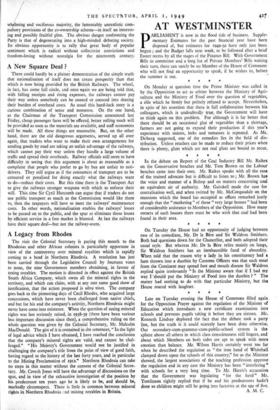AT WESTMINSTER
pARLIAMENT is now in the flood tide of business. Supple.: mentary Estimates for the past financial year have been disposed of, but estimates for 1949-50 have only just been begun ; and the Budget falls next week, to be followed after a brief Easter recess by all the stages of the Finance Bill. With Government Bills in committee and a long list of Private Members' Bills waiting their turn, there can surely be no Member of the House of Commons who will not find an opportunity to speak, if he wishes to, before the summer is out.
* * * On Monday at question time the Prime Minister was called in by the Opposition to act as arbiter between the Ministry of Agri- culture and the Ministry of Food over the question of vegetables, a role which he firmly but politely refused to accept. Nevertheless, in spite of his assertion that there is full collaboration between his colleagues, which is undoubtedly true, the Government will have to think again on this problem. For although it is far better that there should be an occasional glut of vegetables than a shortage, farmers are not going to expand their production if this year's experience with onions, leeks and tomatoes is repeated. As Mr. Driberg suggested, one of the remedies lies in the field of dis- tribution. Unless retailers can be made to reduce their prices when there is plenty, gluts which are not real gluts are bound to recur.
* * * * In the debate on Report of the Coal Industry Bill Mr. Raikes on the Conservative benches and Mr: Tom Brown on the Labour benches came into their own. Mr. Raikes speaks with all the ease of the trained advocate but is difficult to listen to ; Mr. Brown has the voice and manner of a Bishop and on matters concerning coal an equivalent air of authority. Mr. Gaitskell made the case for centralisation well, and when twitted by Mr. McCorquodale on the mansions which the board has occupied as offices remarked justly enough that the " marketing " of these " very large houses " had been of considerable assistance to Members of the Opposition. How many owners of such houses there must be who wish that coal had been found in their area.
* * * *
On Tuesday the House had an opportunity of judging between two of its comedians, Mr. Dc la Bire and Sir Waldron Smithers. Both had questions down for the Chancellor, and both adopted their usual style. But whereas Mr. De la Bite relies mainly on lungs, Sir Waldron Smithers has an inexhaustible fund of absurdity. When told that the reason why a lady in his constituency had a ham thrown into a dustbin by Customs Officers was that such meat frbm the Continent may spread foot and mouth disease Sir Waldron replied quite irrelevantly " Is the Minister aware that if I had my way I-should put the Ministry of Food into the dustbin ? " The matter had nothing to do with that particular Ministry, but the House roared with laughter.
* * * * Late on Tuesday evening the House of Commons filled again for the Opposition Prayer against the regulation of the Minister of Education which introduces a new certificate examination into schools and prevents pupils taking it before they are sixteen. Mr. Kenneth Lindsay deplored the fact that the debate took a party line, but the truth is it could scarcely have been done otherwise. Our secondary-cum-grammar-cum-public-school system is the sphere above all others in which class consciousness still lingers, and about which Members on both sides are apt to speak with more emotion than balance. Mr. Wilson Harris certainly went too far when he described the regulation as " the iron hand of Whitehall clamped down upon the schools of this country," for as the Minister showed, the largest associations of the teaching profession approve the regulation and in any case the Ministry has been " interfering* with schools for a very long time. To Mr. Harris's accusation that the Government was legislating " for the herd " Mr. Tomlinson rightly replied that if he and his predecessors hadn't done so children might still be going into factories at the age of five.
A. M. C.






































 Previous page
Previous page